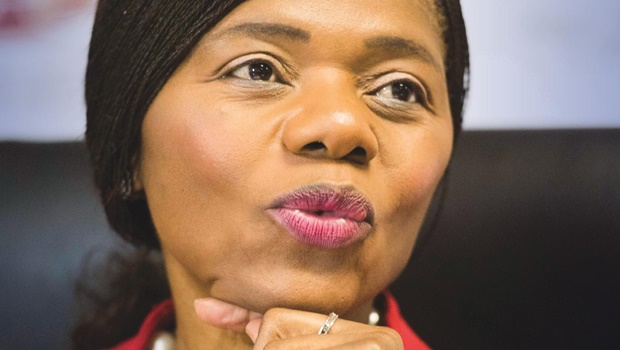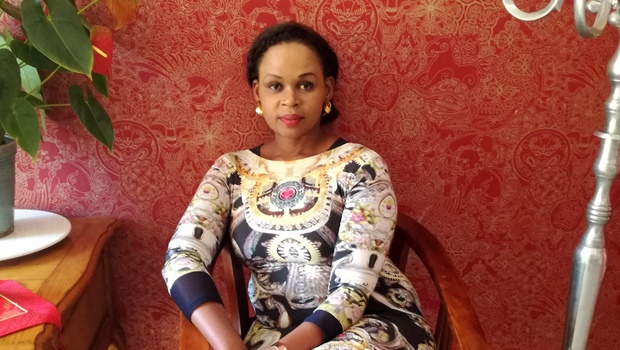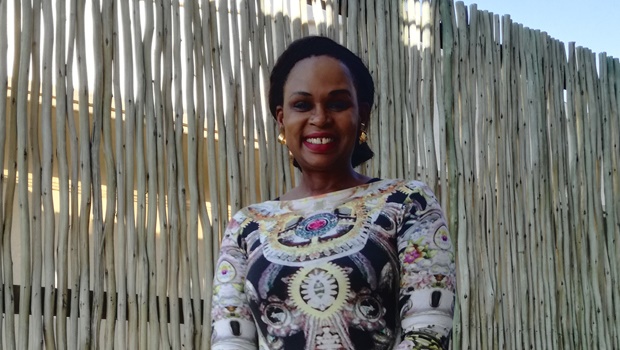
It’s not every day that you get to meet a journalist and author whose own qualities remind me of the very woman she’s chosen to write about.
Thandekqa Gqubule – anti-apartheid activist and one of the eight SABC journalists that was unfairly dismissed due to speaking out against media censorship within the SABC ranks, is as poised, friendly and down-to earth as I expected to be - with no sign of the past year’s tumult anywhere to be seen.
We sat down to chat about the Thuli Madonsela many of us don’t know, what it was like being imprisoned at the same time and how Thuli perceived herself during her time as public protector.
Image: Tammy February
1. When did you first get the idea to write a book about Thuli?
I think halfway through her seven-year tenure I started playing with the idea but I really became serious about it in the last two years of her term.
2. How long did it take you to write the book?
The first part which was the research and the information gathering part took longer than the actual writing, so I'd say a year gathering and signing that contract and a year actually writing.
3. Thuli is someone who defied the expectations of almost everyone – she gave us hope when we desperately needed it. In writing this, you’re not only celebrating Thuli, but you’re reminding South Africa that we have so much to still believe in. Would you say that this is something that was a motivator in terms of why you wrote this book?
Partly, in a sense that what I wanted to do was to step up and explain who she really is because there were many people who didn't understand why she was behaving this way - as if she was being "naughty," whereas I thought that I could contribute by just explaining the essence of who Thuli is at heart.
I also thought I could learn more about everything by just researching because there was a part of Thuli I felt that I could relate to and one that many South Africans themselves can.
4. What do you think are some of the most surprising things that people will discover about Thuli in your book? For example, I was completely surprised by the fact that Thuli rebelled against her father, who actually wanted her to become a nurse.
Yes, and did you notice that they never fell out? He could see that she could make it happen for herself, so the things that surprised me... you know, you never think of Thuli as being naughty.
You really don't, but when her dad was at the stall next to the bus stop and he was busy selling his steel wool, his chips and his sweets, a bus of school boys would pass by.
Thuli would then pretend that she doesn't know this old man who is selling all of his goods (she used to help him at the stall) and hide herself because she's trying to flirt with the boys.
So I never thought she had that funky, funny and mischievous side to her.
What also really surprised me was that by the time I met her, she was so self-composed I would never have guessed that the then 16-year old Thuli was a victim of bullying at school and was considered ugly. She was very insecure and uncomfortable in her own skin.
5. In your book you mention that Thuli sees herself as a Makhadzi – a word that the VhaVenda people use to describe a female leader and a buffer that serves between the ruler and the people and offers advice by giving him counsel. Can you explain how this ties in with the title of the book?
She was looking for a way of explaining the office and was in Cape Town speaking to a group of business people.
She didn't want to give all those legalistic explanations so she said, "Look, I'm like the Venda Makhadzi, who is a Venda traditional figure who plays an important role of being the go-between.”
The Makhadzi is like a sister to the king or an aunt to the king and Makhadzi is supposed to be the impeccable one in the kingdom. Her behaviour is supposed to be exemplary and she's supposed to be above suspicion.
I don't know what to believe about this - I don't have any evidence of this - but I think that the minute she took on the role of public protector there were so many things that I think she cut herself off from.
And I suspect that we don't have any sort of snippets like that not only because I decided not to go there, but because women are so often identified by who they are married to and who they relate to, rather than by their own conduct.
But, I do suspect that there was nothing there precisely because she decided to do this thing as best as she can and not to complicate anybody's lives.
So, the Makhadzi is supposed to be beyond suspicion, like Caesar’s wife and she's supposed to be very transparent in her behaviour and beyond reproach.
At that briefing she said that the role of the Makhadzi is to whisper to the king and the reason why does this is so that the king doesn't lose face and that it doesn’t look as he is being told what to do by the Makhadzi as that would erode his authority. But she is known to be the whisperer - to give good counsel.
So, the main aim of the Makhadzi is to get the king to self-correct or to get people heard by the king. And one of the biggest roles is to plead for clemency, like if you've done something wrong and the punishment is a bit harsh, then the Makhadzi acts as a merciful figure and mediator.
So Thuli explained it that way to people and then she said that "with the Makhadzi system, the king ignores the Makhadzi's counsel at his own peril.”
And if the Makhadzi now starts to shout - remember she has a moral responsibility to tell the king what's going wrong - then it means that the trust has broken down between the Makhadzi, the king and the people the Makhadzi is representing.
So the system of government has gone wrong and that's when you hear the Makhadzi raising her voice. And when the Makhadzi is no longer whispering to power, then there is a problem. So that is where we got the title from.
Image: Tammy February
6. I love that you incorporate a lot of African proverbs, stories and history in your book – in fact, I’d say that because of this – No Longer Whispering to Power almost has a fictionalised storytelling element to it. Did you set out to consciously include this as a narrative in your book when you first started writing the book?
For example, the bit about the San people’s belief about stories in part two of your book…
I'm a bit of a novice to writing commercially like this and so I had to really go overboard in explaining many things through creating images. The San people believe that stories are more than just stories. They are things that can communicate, they can have velocity and they can travel distances.
You start off somewhere and then you end up somewhere else. So the San proverb about stories being like the wind is the most vivid image that I could evoke when trying to explain the Nkandla situation.
I also had a very good editor who, because I was scared, would teach me and say things like "use this here" and she'd say that “this image really captures what you're trying to say here so let me push it to the beginning of the chapter,” so that whenever people would begin the chapter, it would be like ushering them into a house and explaining to them and they'll get what you say later because you've tried to induce them into the chapter with an image that's quite accessible to them.
My favourite proverb in the book is the one that goes "If you think you're too small to make a difference, try spending the night with a mosquito." Ironically enough, it's one of the biggest beliefs that Thuli had, which is that every single South African must make a difference as that would make her job much easier.
7. I don’t think that many of us take into account that the very woman who has fought alongside her comrades for justice and equality couldn’t have found it easy when she compiled those reports that exposed the corruption that’s running so rampant in our country today. What do you feel devastated her most about the Nkandla and State of Capture reports?
Now imagine this: Angie Motshekga was in our prison quad. Angie is now the minister of basic education and it was Angie's husband, Dr Motshekga, who was one of the biggest stumbling blocks - well, I don't want to describe him as such - but he was one of her loudest critics in parliament and one of the people who the court later found, were responsible for parliament not executing their functional oversight over the executive.
One of the people that she had to find against was someone that she used to sit around on campus with and eat lunch with, so I do imagine that it must have been tough.
I think somewhere she explains that “where you know the person you become so much more careful and you try to stick to the law and do your job but you’re also careful not to be too hurtful to this person because you've shared a cup of coffee or tea with this person.”
8. In No Longer Whispering to Power, you wrote that Jacob Zuma was unaware that he was making his biggest political mistake when he appointed Thuli Madonsela. At what point do you think he first realised that Thuli was actually a threat?
She says that she went to see him in his office and in his office she told him how things were going to proceed before the report was released. I think it was at that point that he became aware that he had a problem.
You know, I think it's her way of saying that struggle credentials don’t make wrong doings or bad behaviour right. Just because you've struggled for freedom doesn't entitle you to abuse the freedom of others post liberation.
And you know, I ran into her at the Kathrada funeral - and this is not in the book - and I wanted to tell her that I had sent her the electronic book as a courtesy and she turned to Wenzi, the girl, and she says "Nana, aunty Thandeka is going to reveal some stuff about me in prison, stuff you don't really know, my children and I realised "hauw" - not even her children knew about her time in prison.
She doesn't wear her credentials like a cloak of opulence or like it's a war badge.
WATCH: News24 interviews Thuli Madonsela
10. The day of your arrest, you were betrayed by someone you considered a friend. How profoundly did that affect how you saw white people?
His race is not significant. I should have written that he had red hair. I wanted to actually give an image of what was going on. He's got red hair, he's standing there and he was with the security branch which was actually very mixed in terms of race.
So I don't want it to be a racial issue, it's just to give you an image of what happened that night when I was opening my door at res - and there they stood.
11. Have you ever seen or spoken to this person again?
No, I haven't spoken to person since. I feel that if he that if had come and said after we returned, "Hi guys, I'm sorry, this is how it happened", I would have said "Cool, I understand where you're coming from. This is your explanation and I would have walked away.
But, I'm not yearning for his apology. I had other friends who were also betrayed by this guy. My friend Susan Nkomo and I talked about him and we let it go - just talking about it was enough for me. It was my therapy.
12. What was it like during your time in prison? I imagine it must have been psychologically very damaging.
Yes, I remember that I was always kind of tired, always confused and very dependent on others to - I needed the others to just help me get by. They were really good to each other. The women really looked out for each other.
12. As someone who has seen your fair share of hardships, battles and trials in fighting against injustices and reporting on crime and corruption, what do you do to try and stay optimistic about our country?
Yes, it's fair to say that I'm a bit corruption fatigued. I get jaded and I get cynical and depressed about it.
But you know what, the whole thing about this kind of plunder and attacking - whether you're attacking human beings personally or attacking their collective savings in the form of tax and their contributions to the state, is that part of it is to get you to become cowardly and fatigued.
And because we're human we do get tired and want to retreat, but that's the last thing we should be doing.
13. Thuli is just one of the many heroes South Africa applauds. Which unsung heroes do you think South Africa needs to pay more attention to?
I think a number of people - sometimes not individuals but communities or institutions. Personally, I think that environmentalists are very unsung. They fight against mines, dumping, silicosis, asbestosis - all the ills of the mining industry. So all those guys who go out there and fight for our environment to be clean and for our children's future to be bright, I think they're unsung heroes.
In fact, people in South Africa tend to ridicule them - calling them tree huggers, bunny huggers, etc. and I think that's unfortunate.
Then, I think people who fight for the rights of indigenous and marginalised communities. They are also kind of maligned because they're told that's a struggle from before the century and that it's a relic from the past, but I think they're fighting a good fight.
Also the people I think are really heroes, you know those ladies in Natal who are HIV negative? They go to a breast milk bank and they express for half the day to give healthy milk to an HIV positive baby. Those are the kind of people who define us as South Africans and they make us better than what we are.
14. Finally, what do you think we as South Africans can do to ensure that we rebuild the dream of a South Africa that Thuli (and the majority of us) stand for? What is the advice that you think she’d give us in this tumultuous time?
I think Thuli wants us to all uphold the rule of law in the constitution and then hold power to account because unchecked power is a danger to everything and everyone. And she wants us to, wherever we are, to really care about the South Africa we are busy creating each day in the small things and the big things.
I think she'd feel that wherever you are, you need to take a stand where you are and dip your bucket where you're at. And make a difference, because every small ripple creates change.
Topurchase a copy of No Longer Whispering to Power, visit Takealot.com
Look out for our review and excerpt next week.




 Publications
Publications
 Partners
Partners
















